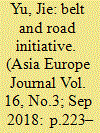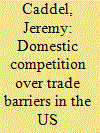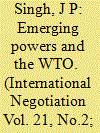|
|
|
Sort Order |
|
|
|
Items / Page
|
|
|
|
|
|
|
| Srl | Item |
| 1 |
ID:
160467


|
|
|
|
|
| Summary/Abstract |
This article explores the linkages between domestic affairs and foreign policies in China in fulfilling its grand ambition of Belt and Road Initiative (BRI). It examines the complexities in decision-making process of “BRI” inside Beijing’s administration. It departs from the most existing literature on BRI in Europe, which focus upon the geo-economic and geo-political impacts of the BRI. Instead, it adopts an “inside-out” approach by examining the actual policy process with a primary focus to individual actors such as the Party, the government department and the state-owned enterprises as well as individual academics. It also disentangles the intricate relations amongst the Party, the key decision-making institutions and the policy execution entities in determining the final outcome of the BRI. It will finally reflect the extent to which Beijing’s bureaucratic complexities have impacted upon the EU and its member states’ willingness in collaborating or in formally endorsing China’s BRI.
|
|
|
|
|
|
|
|
|
|
|
|
|
|
|
|
| 2 |
ID:
133644


|
|
|
|
|
| Publication |
2014.
|
| Summary/Abstract |
As governments lower traditional tariffs, they may use non-tariff barriers, such as antidumping (AD) and countervailing duty (CVD) laws, to protect domestic industries. Research on the US International Trade Commission (ITC), an independent agency responsible for adjudicating AD/CVD claims, finds mixed evidence of political influence in these cases. However, this research focuses predominately on the political influence of the petitioning industry. Applying theories of bureaucratic oversight, I posit that the ITC must be receptive both to petitioners and to firms that oppose trade barriers. Using an original data set compiled from ITC records of witness testimony in these cases, I demonstrate that domestic opposition to an AD/CVD petition has a significant effect on ITC decisions. Moreover, members of Congress actively intervene on both sides of AD/CVD petitions and have some influence on ITC decisions. These results suggest that AD/CVD politics in the United States is better understood as a contest between competing domestic interests than a captured bureaucracy providing rents to protectionist interests.
|
|
|
|
|
|
|
|
|
|
|
|
|
|
|
|
| 3 |
ID:
146452


|
|
|
|
|
| Summary/Abstract |
International trade has become increasingly important to emerging market economies. Concurrently, increasing trade liberalization through the multilateral Doha Round, launched in November 2001, from the World Trade Organization (WTO) has been a failure. The essays in this issue evaluate the role of Brazil, China, and India at the WTO examining in particular their domestic and coalitional constraints, the fairness and justice claims underlying their interests, and the types of identity politics that inform their negotiation positions. These three facets do not make multilateral negotiations easy but they do offer possibilities for future negotiations. Multilateral trade negotiations may not decline but the current era of ‘managed multilateralism’ has become complex balancing great and emerging powers interests.
|
|
|
|
|
|
|
|
|
|
|
|
|
|
|
|
| 4 |
ID:
142541


|
|
|
|
|
| Summary/Abstract |
Many analyses of the role of international norms in world politics study those particular norms that can be classified as relatively robust. Furthermore, such analyses critique alternative theories which foreground the role of domestic interests in affecting the behaviour of state elites, by calling into question the presumed objectivity of interests. The present article takes a different tack to the largely similar challenge. Specifically, it shows – on the example of Russian speakers in Ukraine – that even weak and contested international norms, like the norm of language rights for national minorities, can have independent effects on the behaviour and policy of state elites. The latter holds, in demonstrable terms, if state elites act in ways that militate against their most salient apparent interests. In the Ukraine case, this article argues, such ‘interests’ are the protection of the Ukrainian language as the country’s sole official language. So the cause of the (variable) behaviour of elites in Ukraine lay in a weak and contested norm, namely the norm of language rights for national minorities.
|
|
|
|
|
|
|
|
|
|
|
|
|
|
|
|
|
|
|
|
|